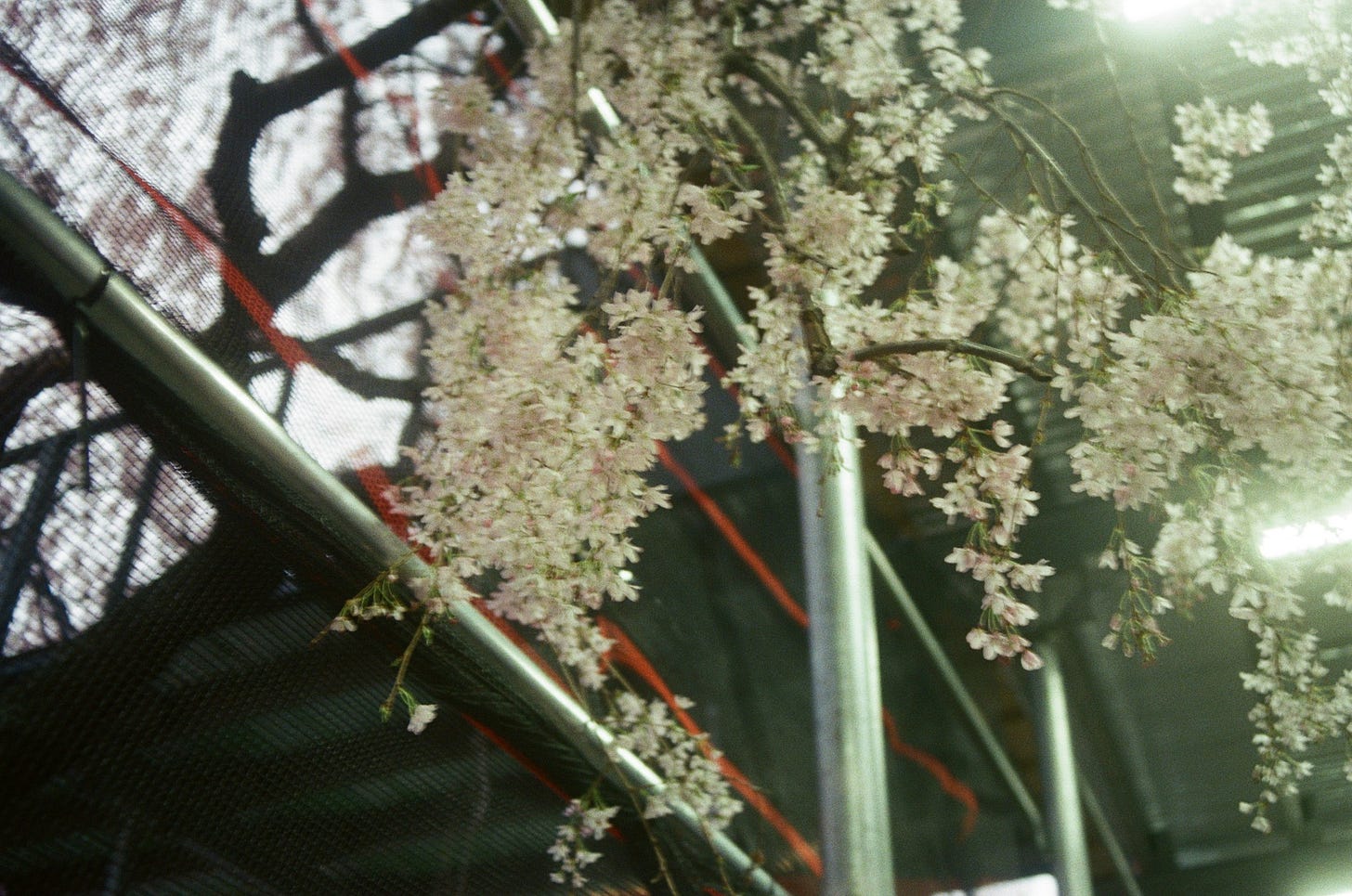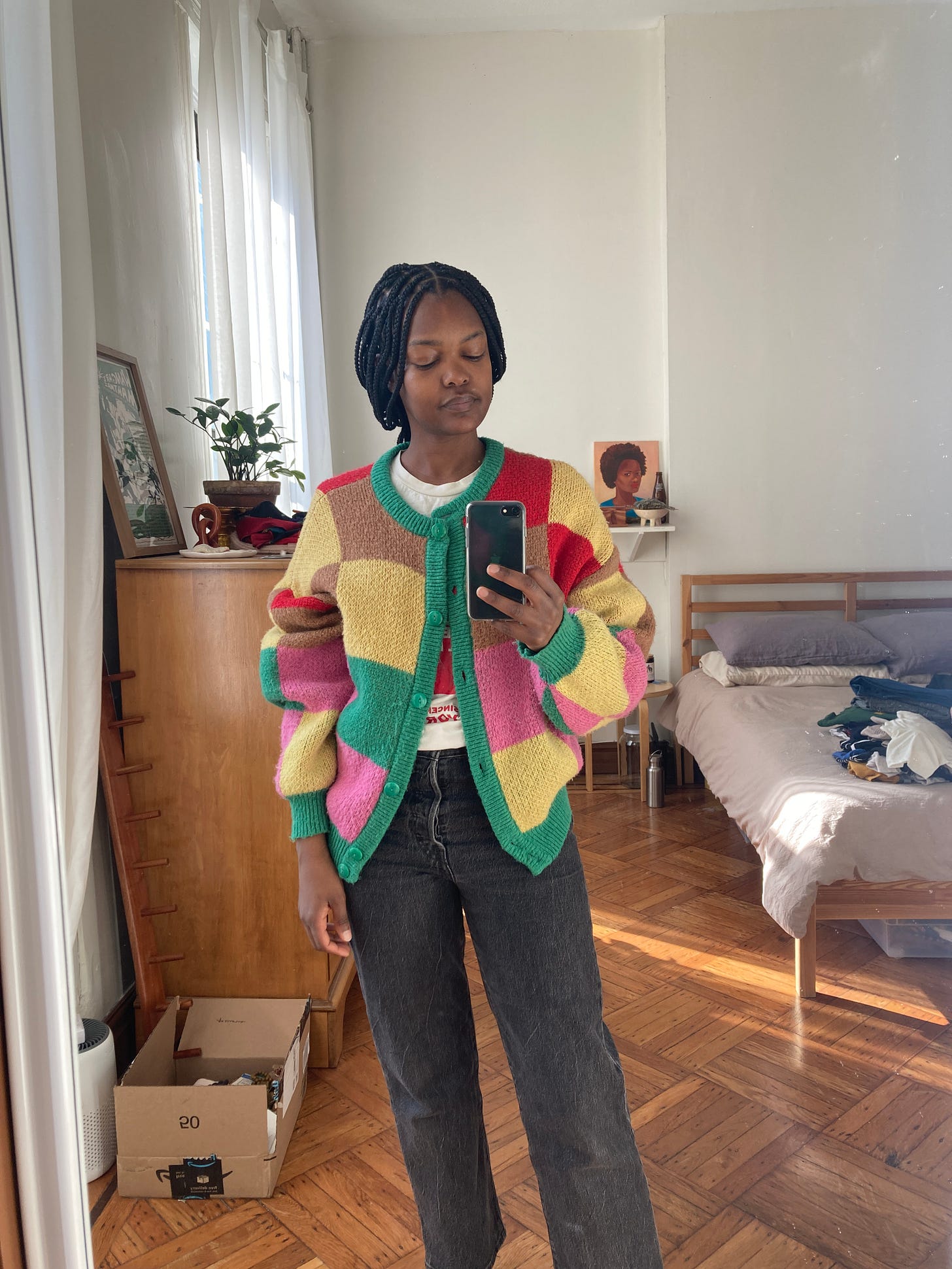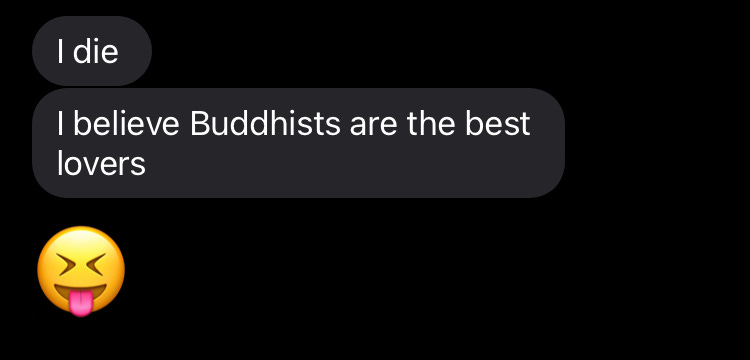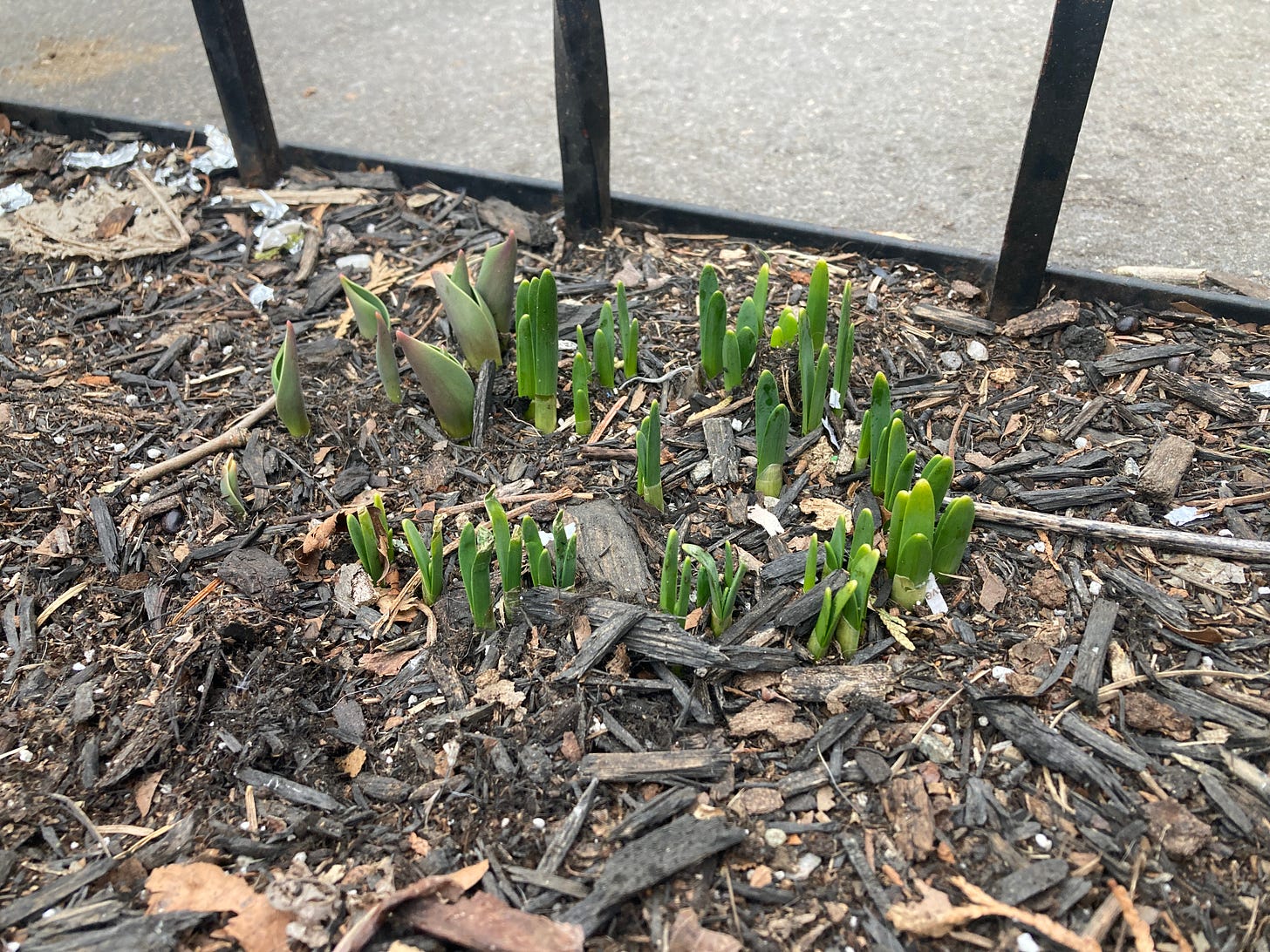on emotional sobriety
thinking about what we share, updates on new writing, and an invitation
I recorded the audio of this month’s SLOWLY, SLOWLY. You can listen below.

Dear Friends,
Has your zone been flooded?
That sounds sexual, and I wish to god that is what I was talking about. No, I’m talking about the term “flooding the zone” (coined by Steve Bannon), the strategy of incessant and unceasing policy announcements meant to attack the “Left” (broadly), keeping it activated and unsteady, unable to discern what to respond to and where to focus energy. The end game is to numb us all into submission.
There’s been a lot of great writing in the first weeks of the Trump administration about resisting this1, and what they have me thinking about is emotional sobriety. Emotional sobriety describes a state of being emotionally healthy enough to deal with the normal shifting emotions of life2. It’s language used in many process-based 12-step rooms, where sobriety speaks to a safety of mind from unskillful thoughts / behaviors / actions / ways of moving through the world (as opposed to abstinence from a particular substance).
The current state of the world feels to me like a fight for our emotional sobriety. With no room to respond between each new dehumanizing policy roll-out, it is tempting to sloppily close ranks in our minds lest it suffer any more blows.
Will we allow greed, anger, and delusion to cloud our minds?
Or can we continue to develop our clear-seeing?
Taking care of ourselves and others is not a given. We’re making an active choice every time we decide to give of ourselves. It has never been more important to specifically cultivate where we choose to place our time, thoughts and energy. Otherwise, with no room to think, we lose the psychological safety in distinguishing what is true or untrue, wise or unwise.
*
I do not want to be drunk in my thoughts, so right now, I am attempting to clear enough room for my mind to settle. One area in which I am trying to apply emotional sobriety is where and how I share myself. Before I share anything, I reflect on what a teacher told my first teacher training cohort: teach from the scar and not the wound.
If you’re unfamiliar with this concept, it’s about building personal awareness around our psychological safety. When I’m speaking about suffering, I want to share responsibly, which means making sure I’m removed enough from the pain of an experience to have some perspective. If I’m speaking from the gushy pus of an open wound, I risk creating harm within myself and others.
Sharing the dharma, I think about - and gut check myself - on this often. How to share my experience in a way that is truthful to me and skillful toward others? So much of my dharma has emerged from darkness, and yet, I think if I publicly shared every detail of my personal experience, I would be far too porous and it would create unhealthy mental states. However, I do believe in the power of vulnerability (this is, in part, a newsletter about “deep vulnerability” after all ). I want to continue to discuss the difficult aspects of the human condition in a way that is authentic and creates connection without falling into trauma dumping.
Thankfully, the Buddha provides a course in study for emotional sobriety in The Eightfold Path. Of those eight, two stand out in relationship to this reflection.
Right Speech: The component of practice involved in how we use our words. Traditionally, this involves abstaining from four kinds of speaking: false speech, divisive speech, harsh speech, and idle chatter. Attempting to speak truthfully, to avoid cruelty, to avoid embellishment or dramatization. In this framing, I attempt to use my words as a tool for connection and clear communication. I avoid using my words for attention, or as a weapon to make others feel small.
Right Intention: The component of practice involving our deeply held intentions and how they determine our experience on the path. This is also referred to as “Right Thought” or “Right Thinking.” Thich Nhat Hahn wrote that “Thinking is the speech of the mind. Right Thinking makes our speech clear and beneficial. Because thinking often leads to action. Right Thinking is needed to take us down the path of Right Action.”3 In this framing, I attempt to check in with my impulse to share my words. A simple, “Is it helpful, is it true, is it kind”4 is a good barometer here.
Sometimes I want to write about a feeling but the words come out incoherent. That sends up a flare for me that the wound might be too fresh. Other times, the words come to me so quickly that I have to stop what I’m doing and write them down, and this usually provides a trail marker for something that is true and that I should explore deeper. A similar type of personal awareness applies to where and how I dedicate my organizing, the intention with which I spend time with friends, and the art projects I choose to develop.
All this said -
How do you think about what do/n’t share and where you apply your energy? How do you feel about applying emotional sobriety to your life? Have you heard of this emotional sobriety before, or, if it is your first time learning about it, what does it bring up for you? If you’re reading this through the Substack app, how do you think about sharing in this space? - especially as the personal essay reigns supreme on this platform!
xo Jessica
Thank you for reading SLOWLY, SLOWLY. If you would like to support this work, in the spirit of generosity, please consider becoming a paid subscriber. Otherwise, a click of the ♡ button goes a long way toward supporting my work. So does leaving a comment or sharing these words with a friend.
NEW WRITING: MY FAVORITE MISTER (FRUIT)
I wrote a short essay about my favorite niche Brooklyn micro-chain, Mr. Fruit 🥭, for Urban Omnibus's new series on Romantic Urbanism guest edited by Daphne Lundi and Louise Yeung. It’s about walking the same paths again and again, practicing intimacy, and networks of care. ❣️
“New York City has around 13,000 bodegas. These neighborhood institutions — part grocery store, part sandwich shop, part coffee shop — are key nodes in the city’s network of social infrastructure. They are places where New Yorkers engage in what Samuel Delany calls contact: the fleeting moments of connection with strangers that may not seem like much but can become the building blocks of community support systems during a crisis. Frequenting bodegas during some of our rawest and more vulnerable moments, we practice public intimacy. When we buy frozen dinners because we are too exhausted to cook for ourselves, when we are sick and drag ourselves out of bed to buy tissues and cold medicine, when we are on our periods, when we need hangover cures, when we need condoms, and when we indulge in late night guilty pleasure snacks. For Jessica Angima, like so many residents of North and Central Brooklyn, the grocers known as Mr. Fruit are cornerstones of care for self and community.”
– DL & LY
Again, care is not always a given and it is a miracle that I am able to provide myself with what I need and offer some of that in return. Here is the link to read “My Favorite Mister (Fruit)”.
Gratitude to Daphne and Louise for the invitation to contribute to this series! You can get updates on the Romantic Urbanism Project here and here.
JOIN ME NEXT MONTH FOR THE ENGAGED DHARMA BOOK CLUB
The Next American Revolution by Grace Lee Boggs
SAVE THE DATE: Sunday, March 30 from 3:00 - 5:00 pm ET | Online
Next month I am co-facilitating the Engaged Dharma Bookclub, a bi-monthly online offering from my dear friend
, where we read political text with like-minded spiritual community. We’re going to be exploring The Next America Revolution, a visionary book by the Detroit activist and organizer, Grace Lee Boggs. I’m looking forward to speaking about the interdependent mission of “growing our souls.”You can join us next month by becoming a paid subscriber to
newsletter, . In addition to the gathering itself, you’ll get access to the weekly Chats via the Substack app, where we’ll have conversation about The Next American Revolution in the weeks leading up to the book club. 🤓SUBSCRIBE TO RADICAL CHANGE »»»»
Heads up: Adriana has coordinated a 20% discount for the Engaged Dharma Book Club reads at Sellers Books in Jim Thorpe, PA (her current haunt). You can find the instructions for accessing the discount here.
Here are some bips and bops of things on my mind this month.
Have you considered hosting a clothes swap with your friends? My friend Jessica regularly hosts clothes swaps which are both a great place to meet cool / fun / politically engaged people in New York City and a no-cost way to add new items to my wardrobe and let go of the solid items in my closet that are no longer getting love. Any of the items that don’t find a home at the clothes swap are then sold at community fundraisers for Gaza. The last fundraiser Jessica co-hosted raised $6K! Look out for the next fundraiser here. You can search the Shareable index for tips on how to host a successful clotheswap5.

A brown-skinned woman with braids pulled back in a ponytail. She wears a checkered knit cardigan in shades of pink, green, and yellow. In the background are a bed with a pile of clothes, a dress with a plant and framed art on top of it. Items are leaned up against the dresser. I’ve worn this sweater at least five times in the week since I grabbed it from the clothes swap! I am wearing it right this moment! I’ve been wanting to write something about sex, intimacy, and the third precept “I undertake the training to refrain from misuse of sexuality and the senses” or “Aware of the suffering caused by sexual misconduct, I undertake the training to refrain from using sex in ways that are harmful to myself or to others. I will attempt to express my sexuality in ways that bring joy and feelings of connection” (Larry Yang) or “Knowing how deeply our lives intertwine, I undertake the precept to protect the sexuality of myself and others” (Leslie Booker). The translations themselves have a lot to explore! I’m pulling together some threads about this but in the meantime, I’m curious: what would you be interested in hearing about sex and dharma?
I went running for the first time since 2013. Word on the street is that spring is coming! I jogged by so many buds just barely peeping their heads above ground. 🥹 Also now, that I am cultivating a new personality as a runner, I am acquiring new gear. I’ve got a tab open for this sports bra.
Listening to Eusexua reminded me of Björk and I returned to Sonic Symbolism, which is a podcast where Björk breaks down each of her album’s sounds and influences. I picked up at Medúlla and stopped at Volta where she speaks about returning to the world after becoming a mother, being free of nationalism, and declaring independence. If you love Björk, I highly recommend it.
Work with me.
You can find me five days a week at Arena and often at 462 Halsey Community Farm.
🌞
I have been thinking about this one a lot: How Much Do I Really Need to Know?
From “The Heart of the Buddha’s Teachings” by Thich Nhat Hanh. This is my dharma bible! Get yourself a copy of this book if you’re looking to delve into Buddhist study.
I tried to look up the origins of this gut-check exercise and it looks like it is both Buddhist and popularized by Bernard Meltzer!









Love this Jess: I do not want to be drunk in my thoughts, so right now, I am attempting to clear enough room for my mind to settle.
I think about what and how to share all the time so I appreciate this reflection v much 🙏
Beautiful. Thanks for offering the ways that you're walking the line between honest vulnerability and psychological safety/skillful speech. It makes me think of the adage "write drunk, edit sober" and how that applies to emotional inebriation / sobriety. Also THANK YOU for introducing me to Sonic Symbolism! Bjork is my everything. 🌺